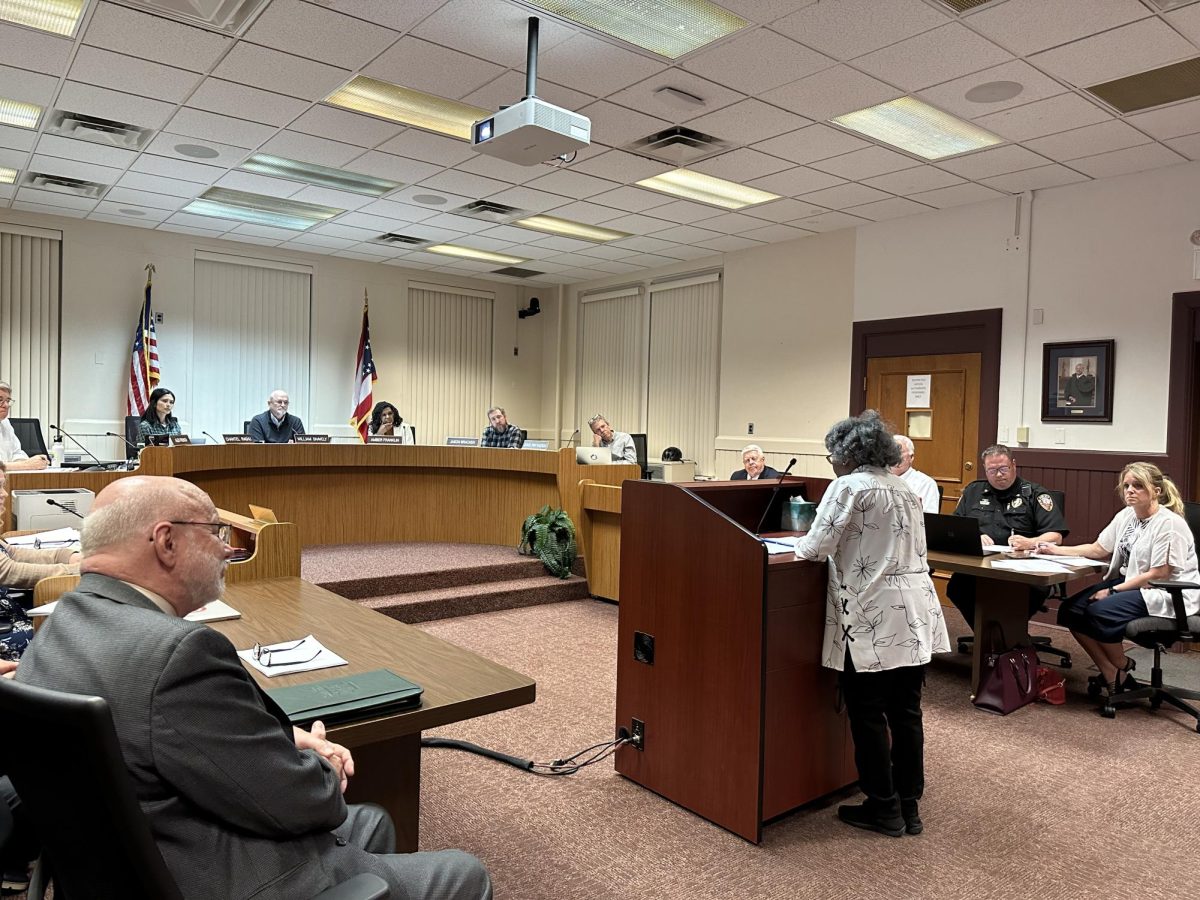At a boisterous city council meeting April 16, residents and members of the local NAACP chapter aired grievances about an internal investigation which exonerated police in the violent arrest of a Miami football player.
“This is not about improved PR,” said Ann Fuehrer, secretary of the Oxford branch of the NAACP. “We are asking for improved procedures. We are looking for justice.”
On April 10, sophomore Devin Johnson was convicted for misdemeanor resisting arrest and assault for an incident that took place in Brick Street Bar November 2023. The video of police officer Matthew Blauvelt giving three strikes to Johnson’s head and neck area and two knee strikes to Johnson’s body while attempting to restrain him on the ground went viral in December of last year.
About 40 residents sat in a packed city hall for over two hours discussing the type of force used against Johnson and the laws which permitted it.
There were also complaints that the investigators did not interview Johnson for their report. Council also heard grievances on the management of evidence and incident reporting by the police department.
Student Rajershi Banerjee with Ohio Youth Alliance said that “blows to the head can be fatal,” and that he “cannot tolerate police officers employing violence, excessive force, and shifting blame onto the victim.”
Banerjee called for Blauvelt to be “barred from ever serving as a police officer again,” and to be held “legally accountable for his actions,” Banerjee concluded.
Police Chief John Jones said this demand was “absurd.”
“[Blauvelt] is a veteran officer who has served his community very well,” Jones said.
According to Jones, “it was the punches to the neck that made Mr. Johnson stop doing what he was doing.”
Vice President of Oxford’s NAACP, Vanessa Cummings said the initial report by the five officers on the scene of the bar arrest “didn’t disclose the head blows,” and were only added to the amended report after a third video was released on social media.
“[Johnson] was being restrained by civilians on the ground, and then police come in, and it feels like they’ve joined in,” Cummings told council. “You’d feel like you’re in a life or death situation, especially as a Black person.”
“You may disagree with it,” Jones said, “but that is why the Supreme Court [decides], not someone on city council who has probably never been in a fight before.”
Williamson of Dayton, and Hollingsworth of Centerville, were hired by the city council to complete an independent investigation, and “found that the officer’s actions were reasonable, given the facts and circumstances,” Hollingsworth said.
Jones told council there were “no violations in police procedure.”
The initial incident report only included interviews with the Oxford Police Department and employees at Brick Street Bar, and that Johnson was never interviewed.
“It seems like a major missing piece,” councilor Jason Bracken said.
Hollingsworth and Williamson said that interviewing Johnson would have put them “in a position to be subpoenaed by the prosecuting attorney.”
“Did we want to know what Mr. Johnson had to say? Of course we did. But we saw video evidence that corroborated the story,” Hollingsworth said.
President of Oxford NAACP Fran Jackson said “we have some dissatisfaction and unanswered concerns,” and said the report “only speaks to the police perspective.”
“There is a lack of communication and proper reporting of the incident,” Jackson said.
Dylan Halpin, a Miami student and former Brick Street Bar employee, said that a statement released by the bar about the incident contained “multiple statements with what we now know to be either lies or mistruths.”
Halpin said it was “odd” that the report did not include an interview from Johnson, “only Brick Street employees and police officers.”
The initial report from the night of the incident included witness statements and three videos of security footage from the bar.
“Five of the officers involved that night saw all three videos, including the one that made it to social media, and none of them told the chief,” Hollingsworth said, and recommended there “be some improvement in the way in which the department communicates.”
“The real problem in this whole situation was the miscommunication internally,” Jones said. “There were mistakes made in all of this, but I don’t think Officer Blauvelt made any mistakes,” he added.
Linda Kimball, a member of Oxford NAACP, said she wanted the report to have “addressed more of our concerns, answered some of our questions, and had led to policy improvements and corrective concerns.”
“I think our public money for an independent investigation was not well spent,” Kimball said.
The NAACP is calling for a public meeting with city boards, including the Police Community Relations & Review Commission, the Civil Rights Commission and the Community Student Relations Commission to discuss the issue.
Cummings said the meeting would allow the community to discuss and understand what’s happened and how to improve relations with the police department, our students and our community.”








